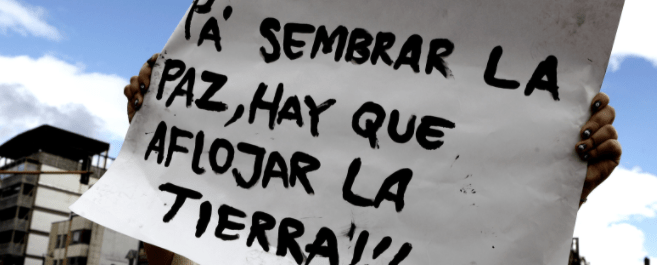Colombia must abolish paramilitary organizations and comply with the UN Declaration on the Rights of Peasants

On March 1, 2021, Nury Martinez, president of the National Agricultural Trade Union Federation of Colombia (Federación Nacional Sindical Unitaria Agropecuaria, or FENSUAGRO) – a member organization of La Via Campesina – addressed the plenary assembly of the 46th session of the United Nations Human Rights Council. She denounced the systematic violence and repression against peasant organizations in Colombia, as well as the non-compliance with the Peace Accords and the continuing state and paramilitary violence against social leaders.
“Five years after the Peace Accords, more than 1,000 social leaders have been killed, mostly peasants, indigenous and Afro-descendant communities, indicating that in Colombia, one social leader is killed every 41 hours,”, said Martinez.
Through CETIM, and with the support of Friends of the Earth International and FIAN International (allied organizations of La Via Campesina, with consultative status at the United Nations), the peasant leader participated in the debates on the occasion of the presentation of the annual report of the Office of the United Nations High Commissioner for Human Rights in Colombia.
The report in question echoes the concerns of social organizations and grassroots movements, in that it refers to “the lack of progress in the adoption of a public and criminal policy – as foreseen in the peace agreement – to dismantle criminal organizations, including those referred to as successors of paramilitarism and their support networks”.
In light of this, the Office of the United Nations High Commissioner for Human Rights in Colombia reiterates the urgent need to dismantle paramilitarism.
In her intervention, Martinez highlighted the particularly violent repression against peasants and against her organization: “Since its foundation, FENSUAGRO has been subjected to various forms of harassment, more than 700 of our affiliates have been killed or disappeared; there is a high level of under-reporting because the victims do not denounce as they are afraid of reprisals. We know that they are paying to murder peasants who try to return to their land”.
The Colombian State is de facto responsible for these violations and must comply with its national and international human rights commitments: these are the basic conditions for the construction of an effective and lasting peace for the Colombian people.
In light of the above, Nury Martinez urged the Human Rights Council to demand that the government promotes, among other things, “structural changes that address the historical causes of the armed conflict: the problem of land, poverty and social exclusion in rural areas,” but also “to abolish paramilitarism” and “to commit to the UN Declaration on the Rights of Peasants and other people working in rural areas”.
